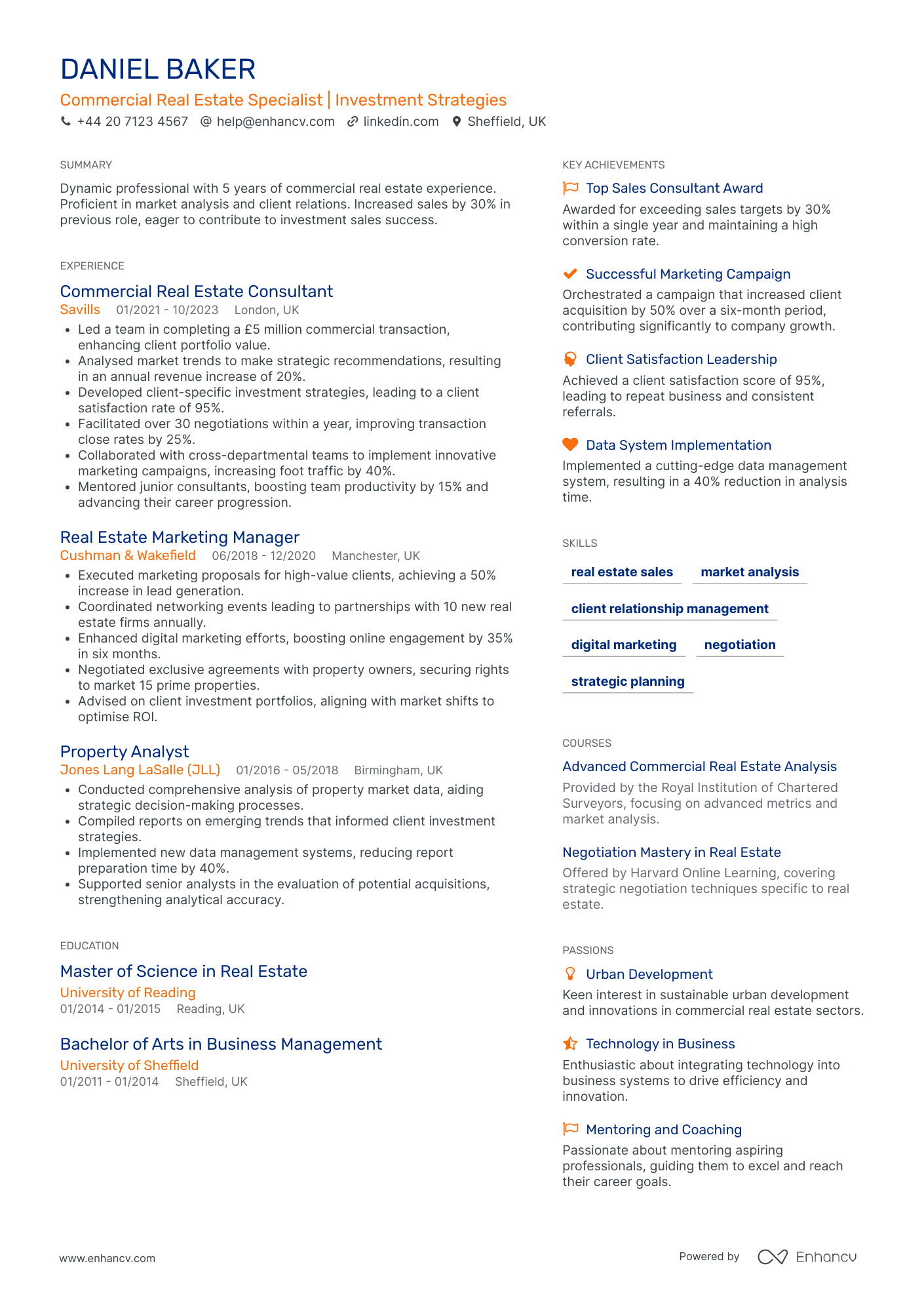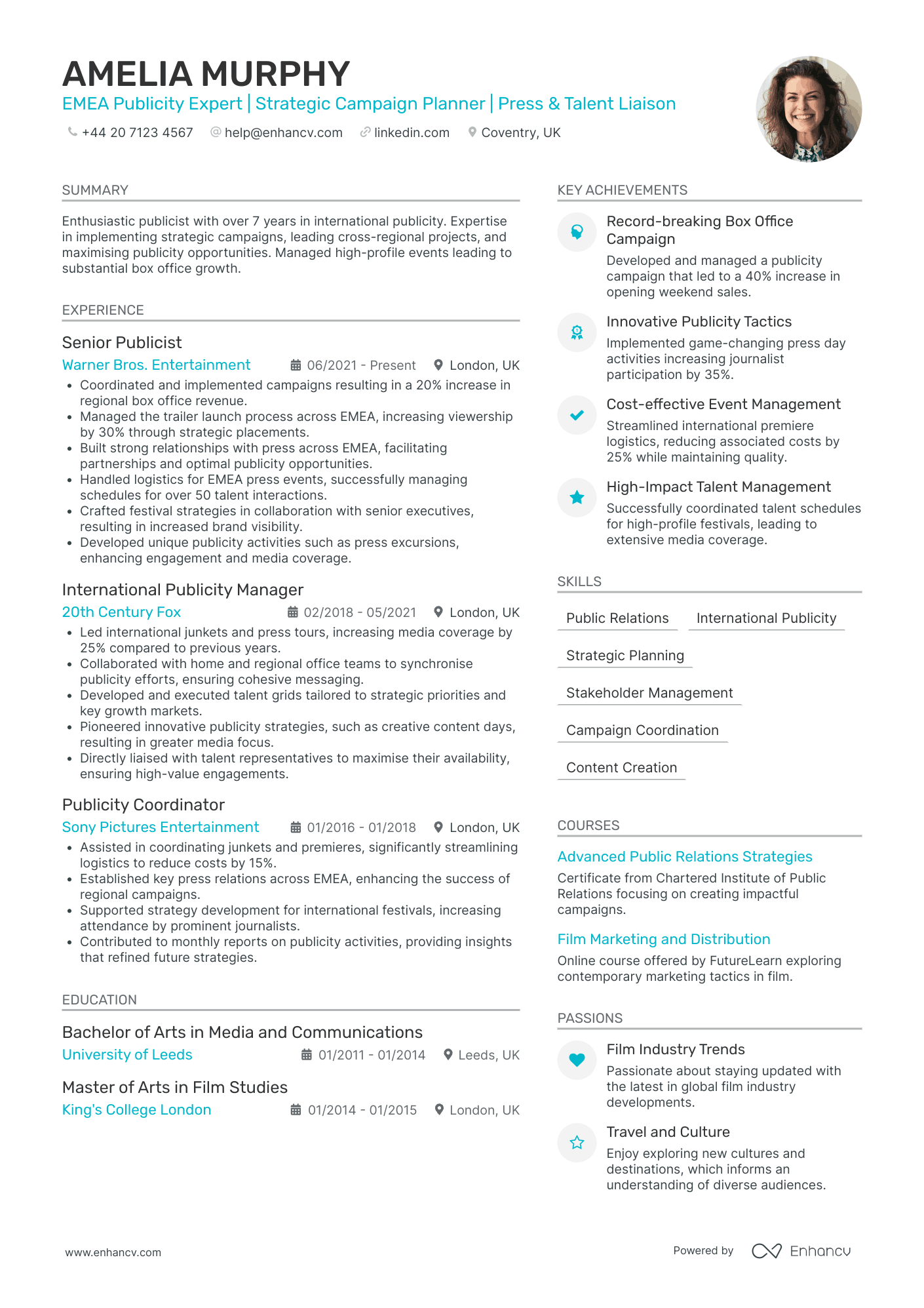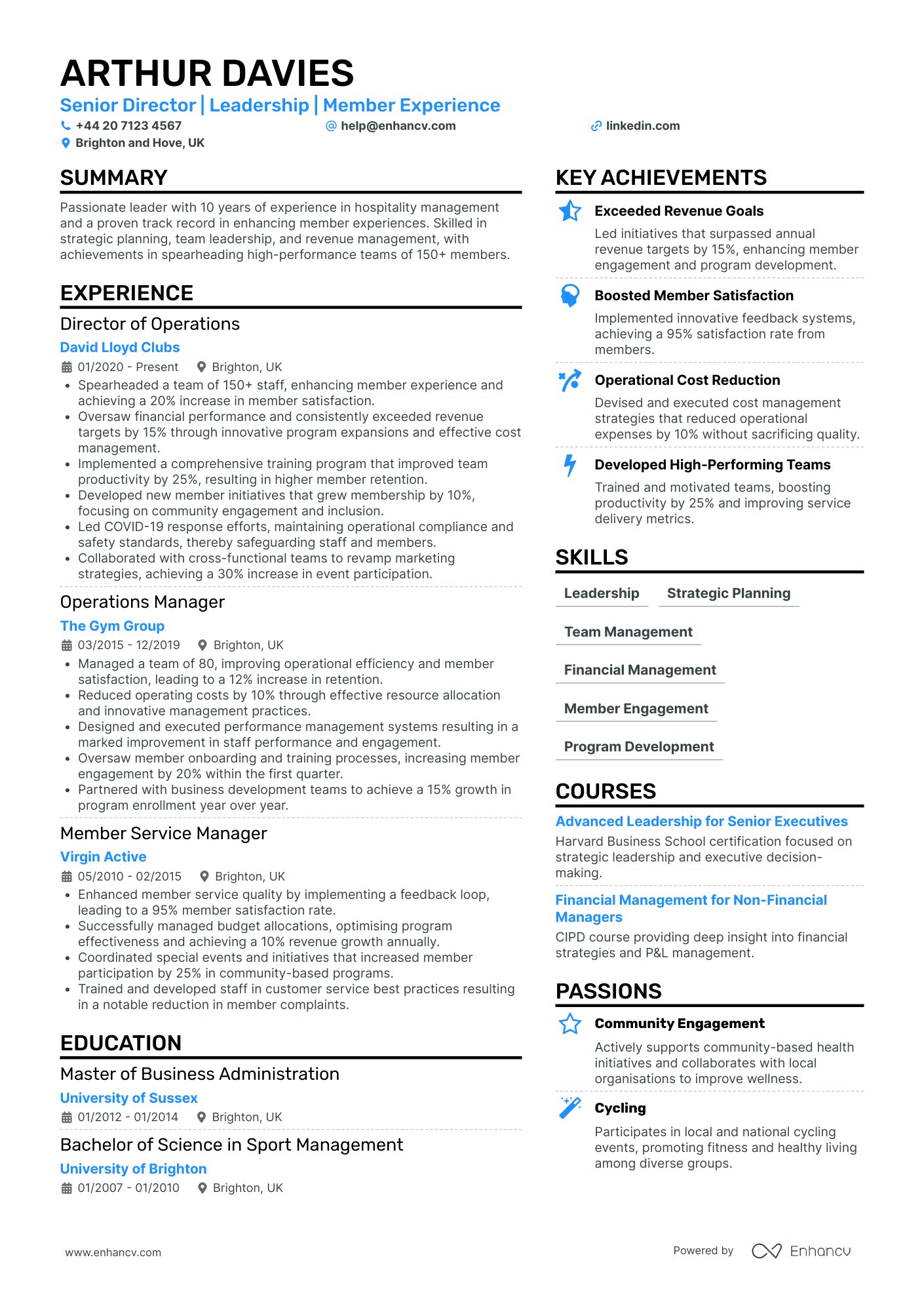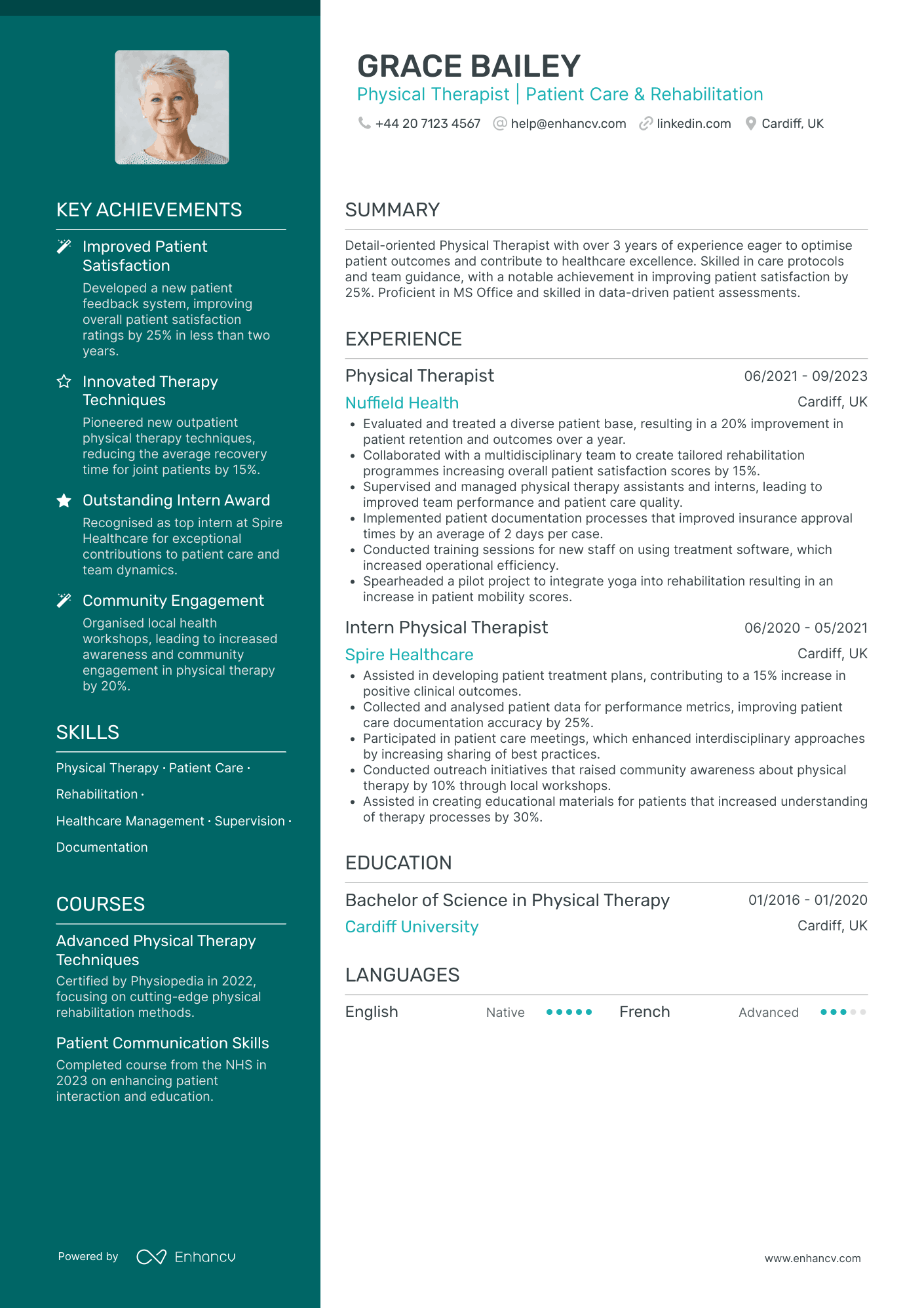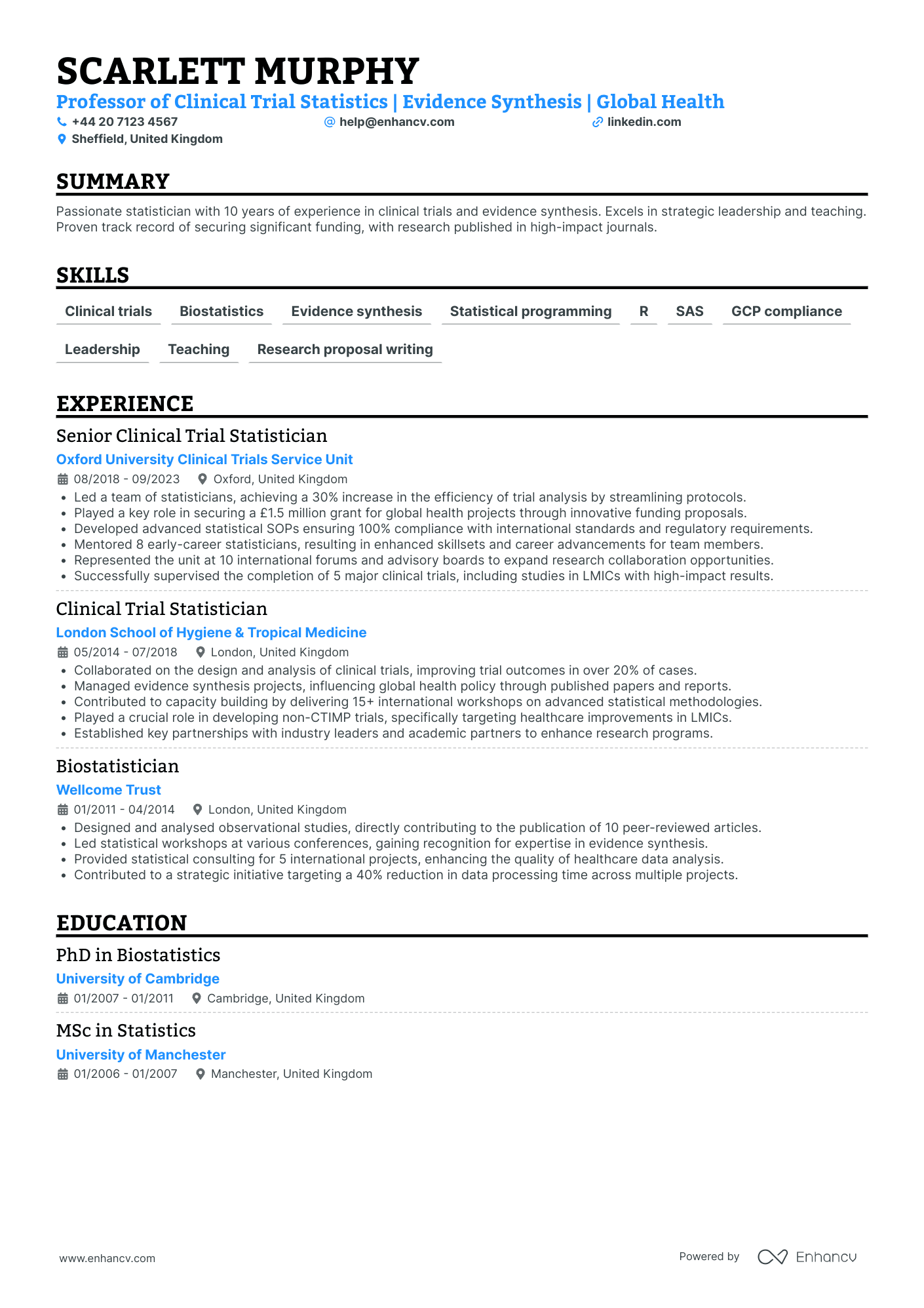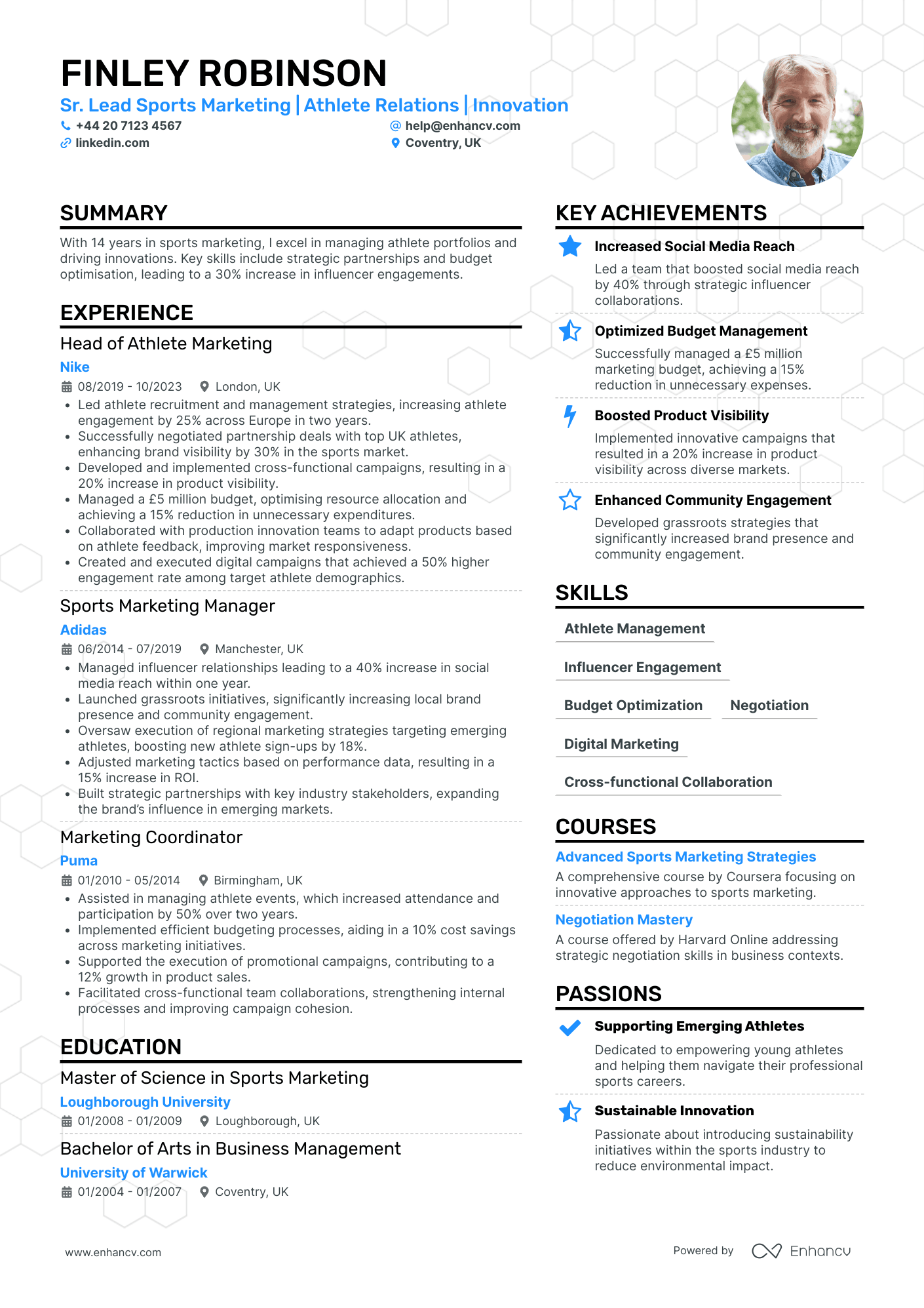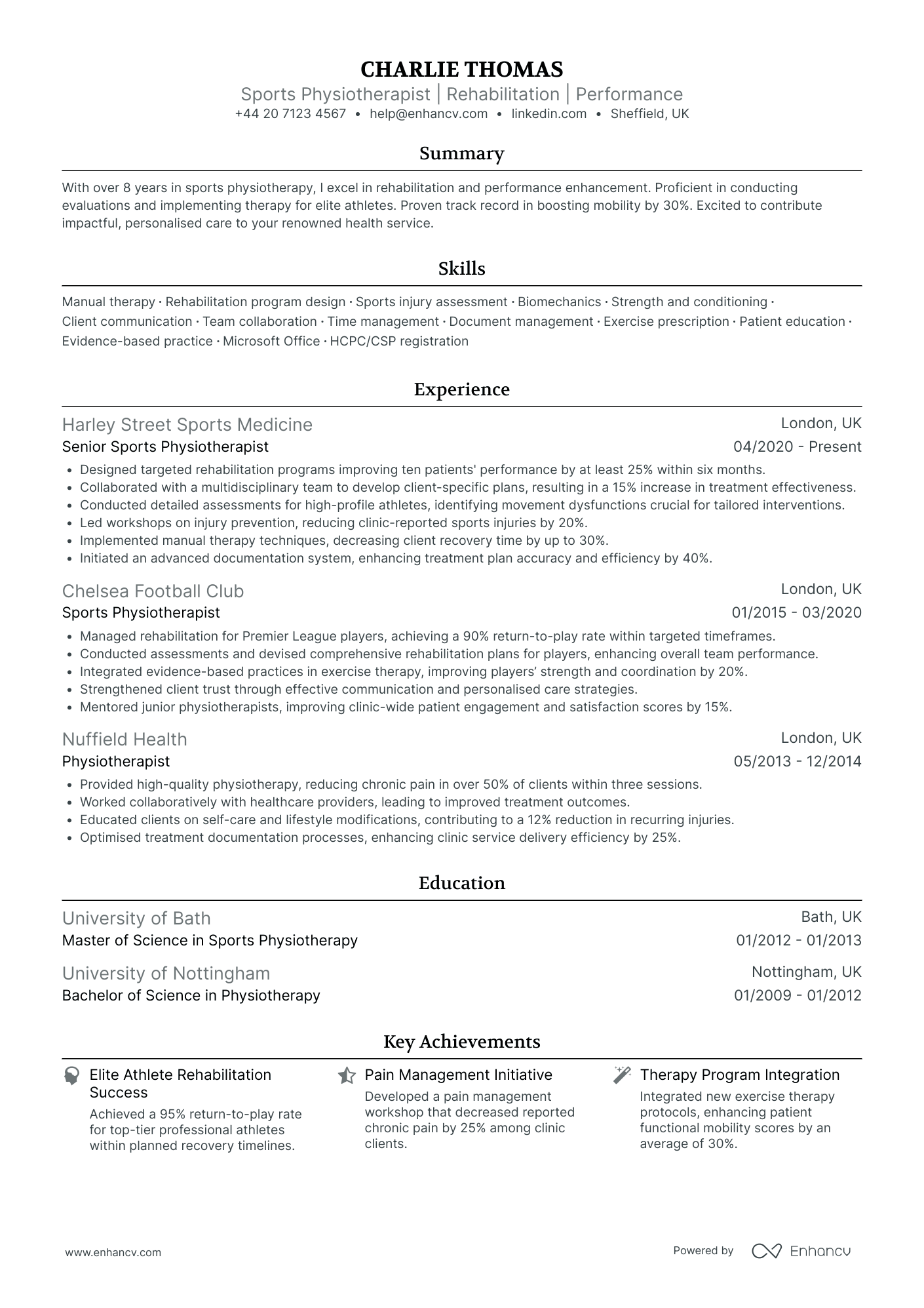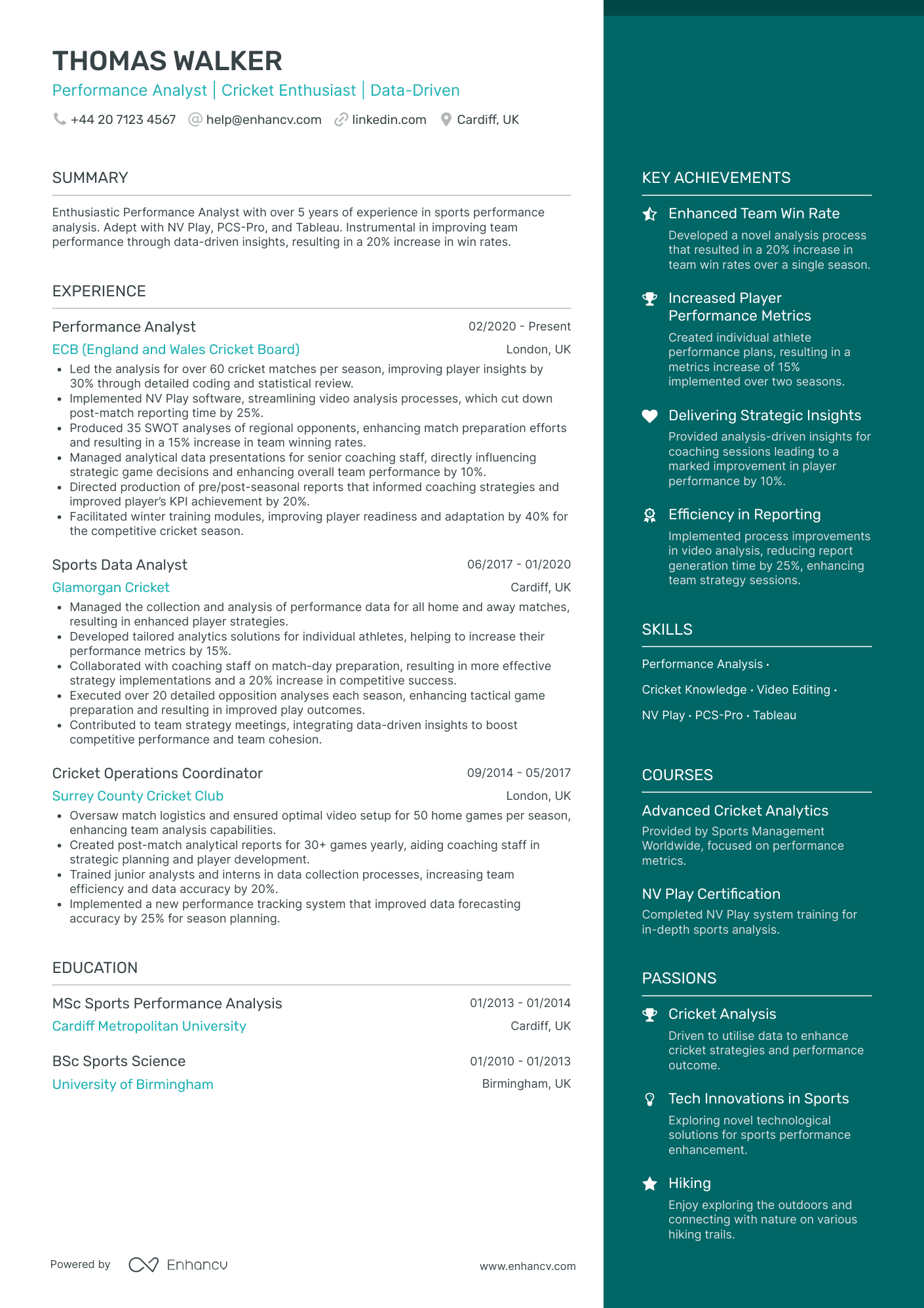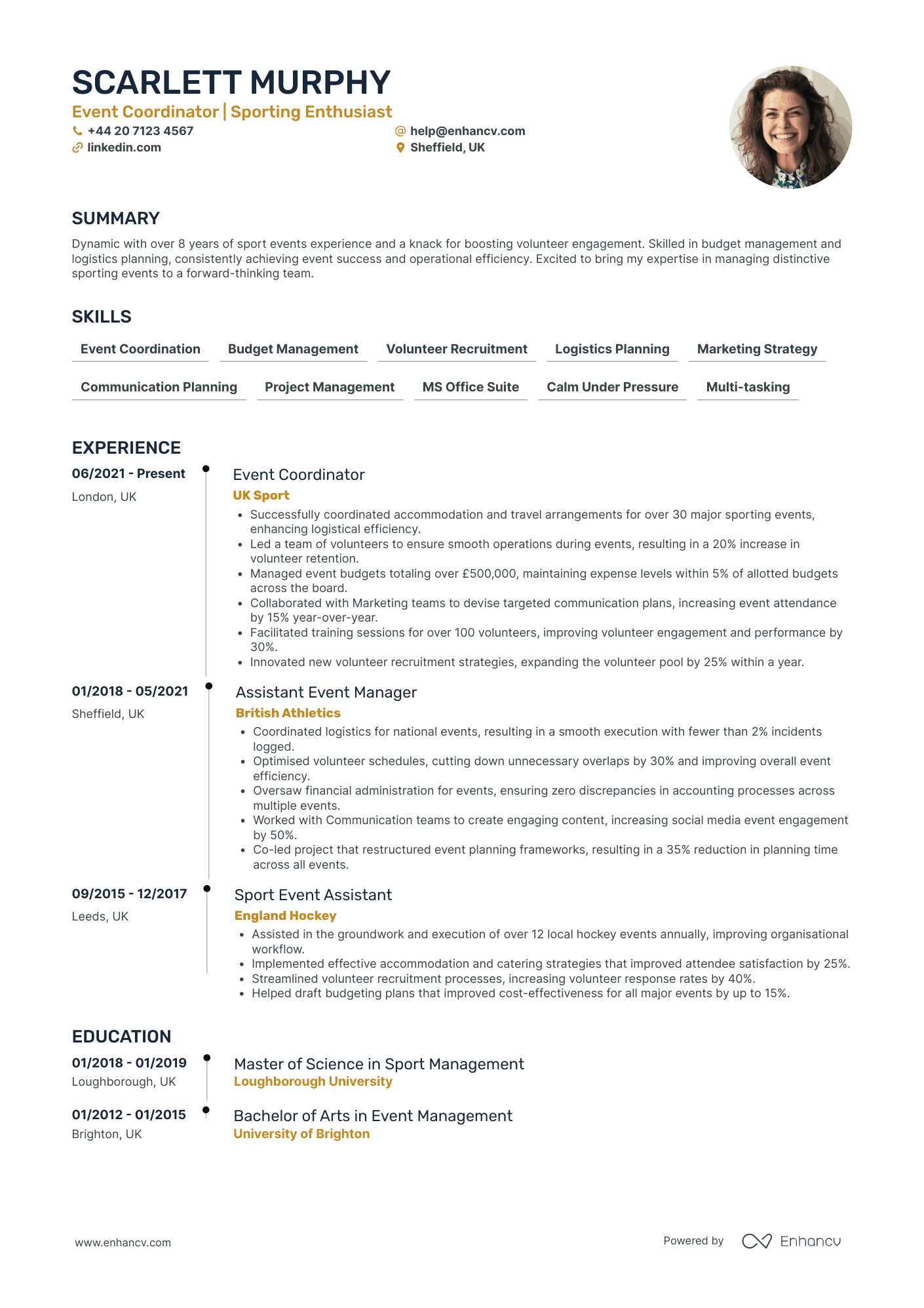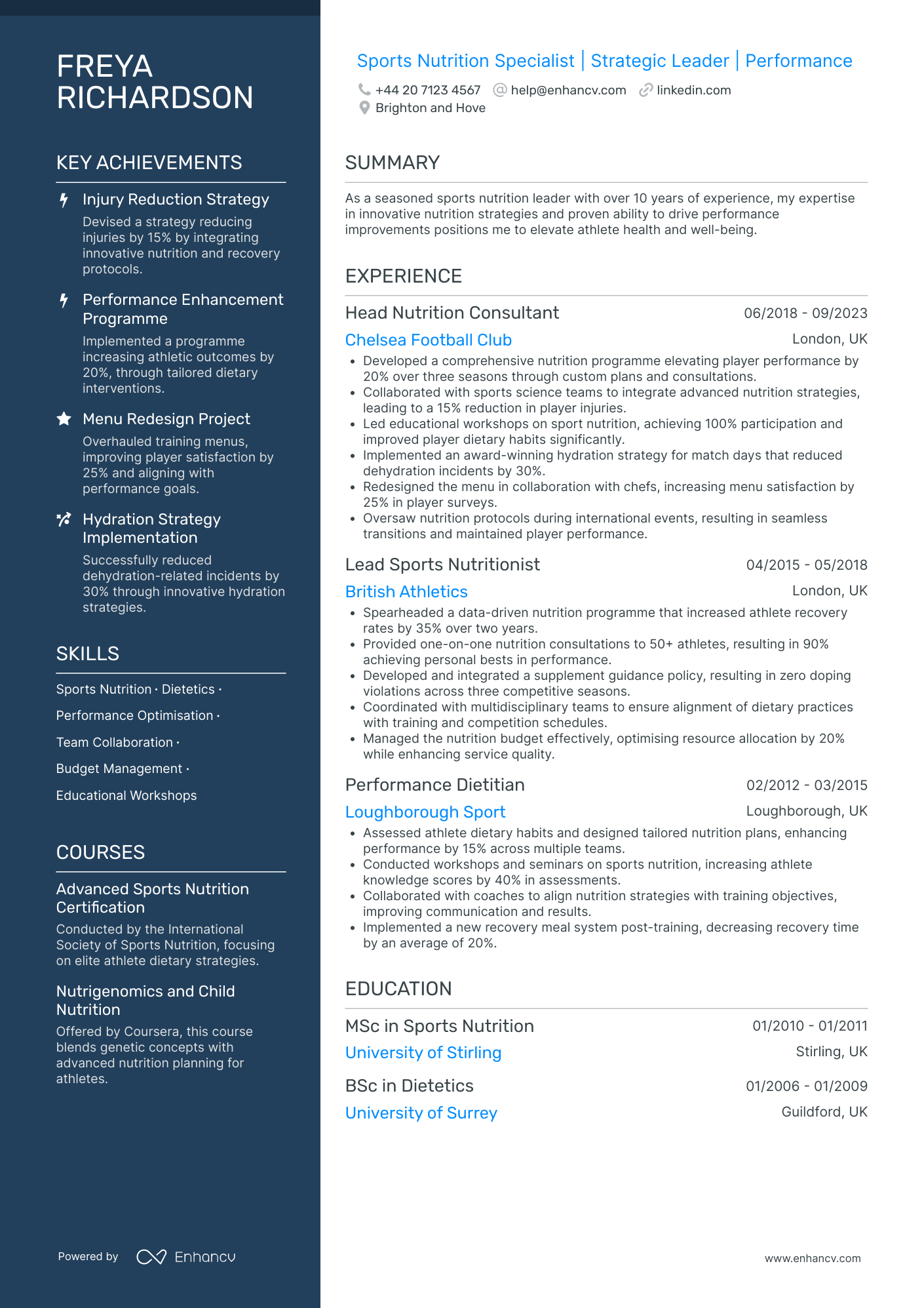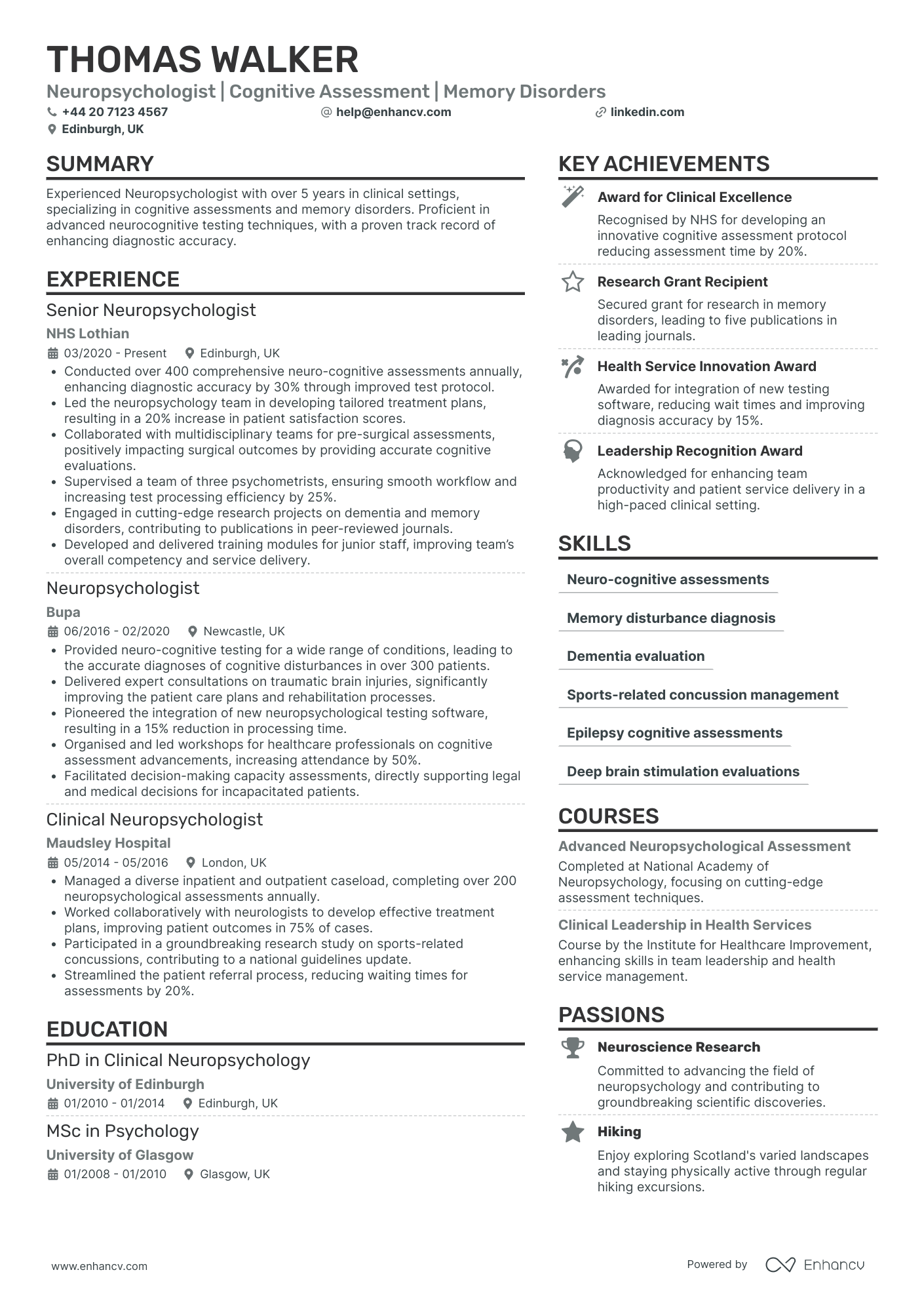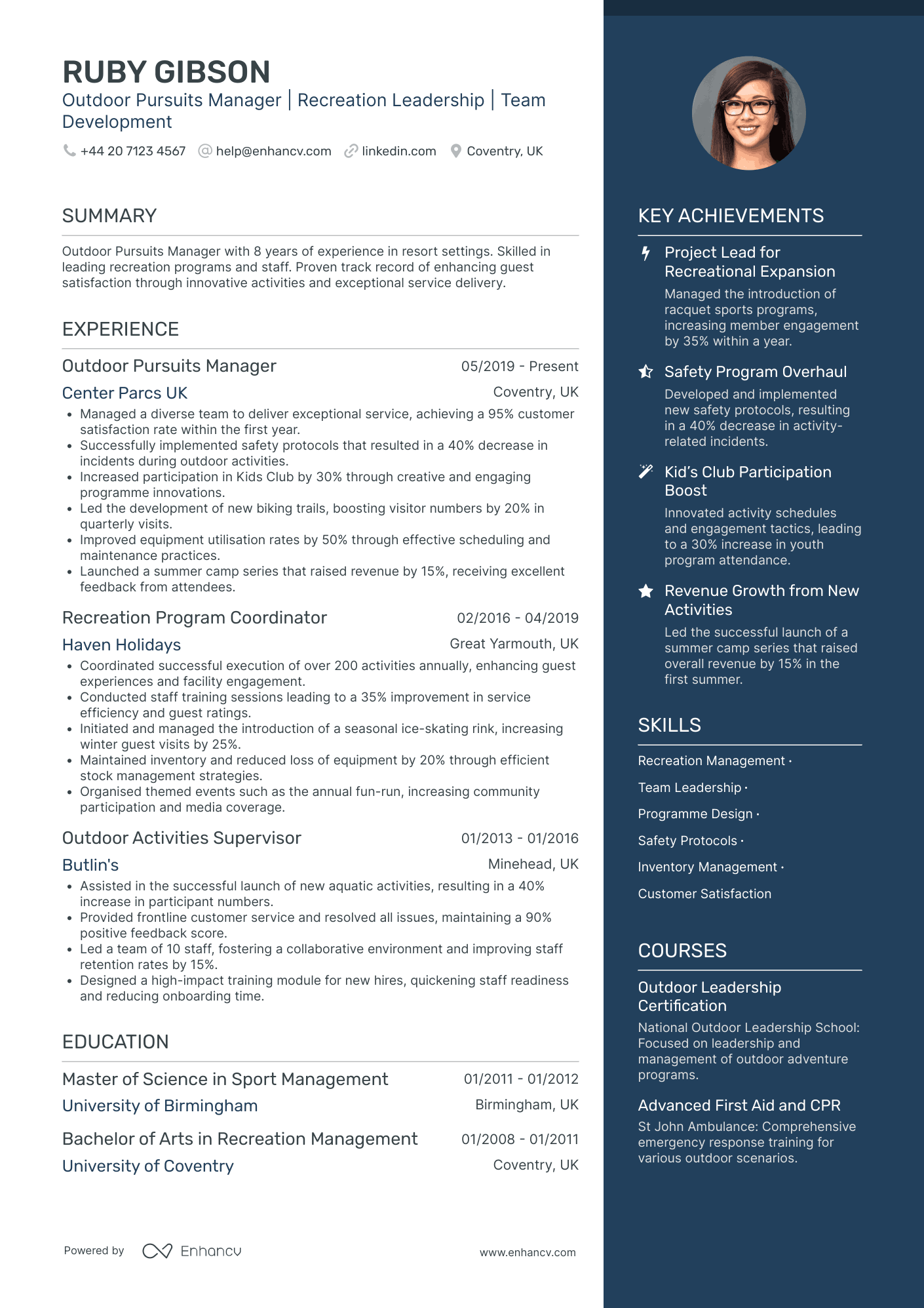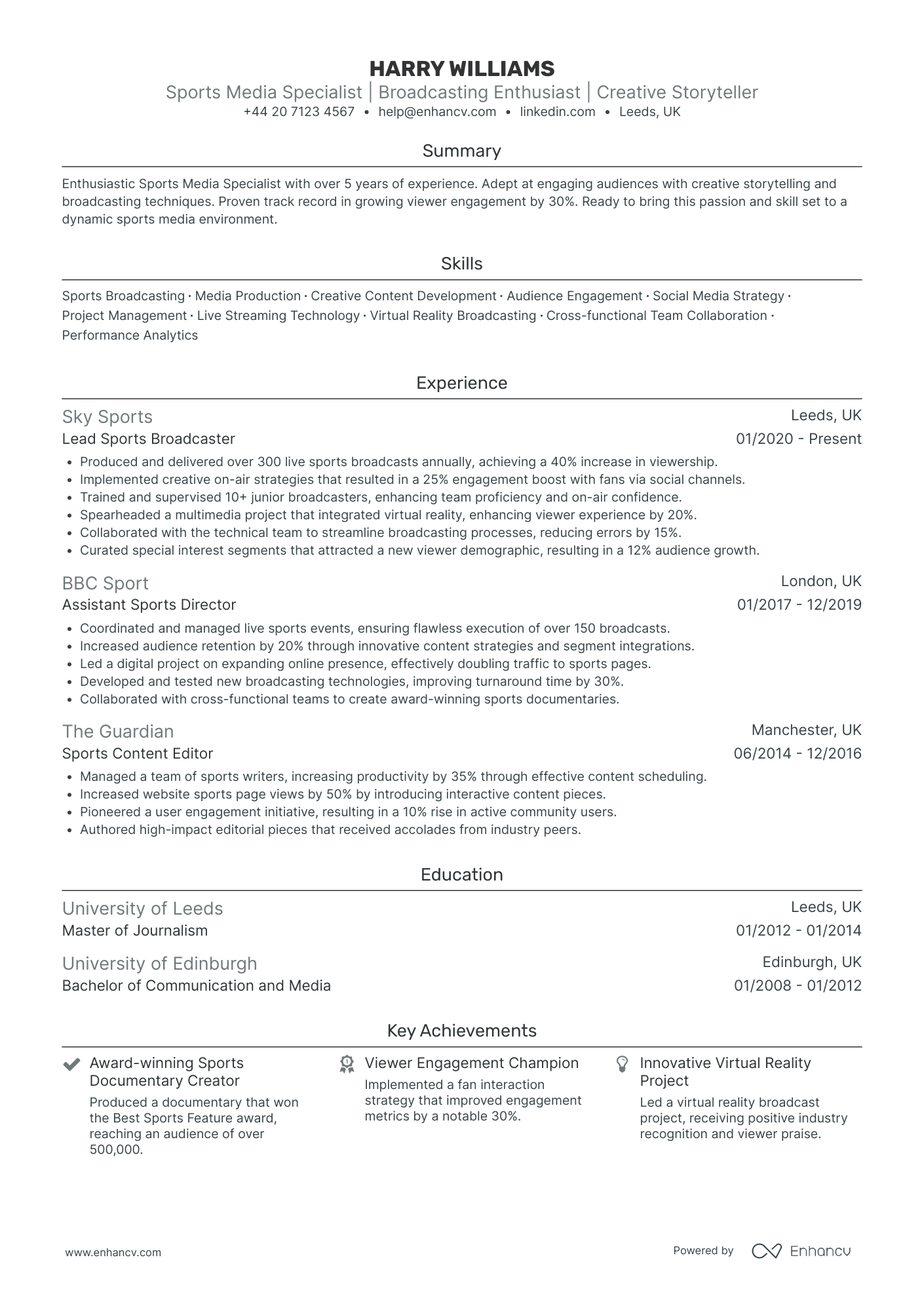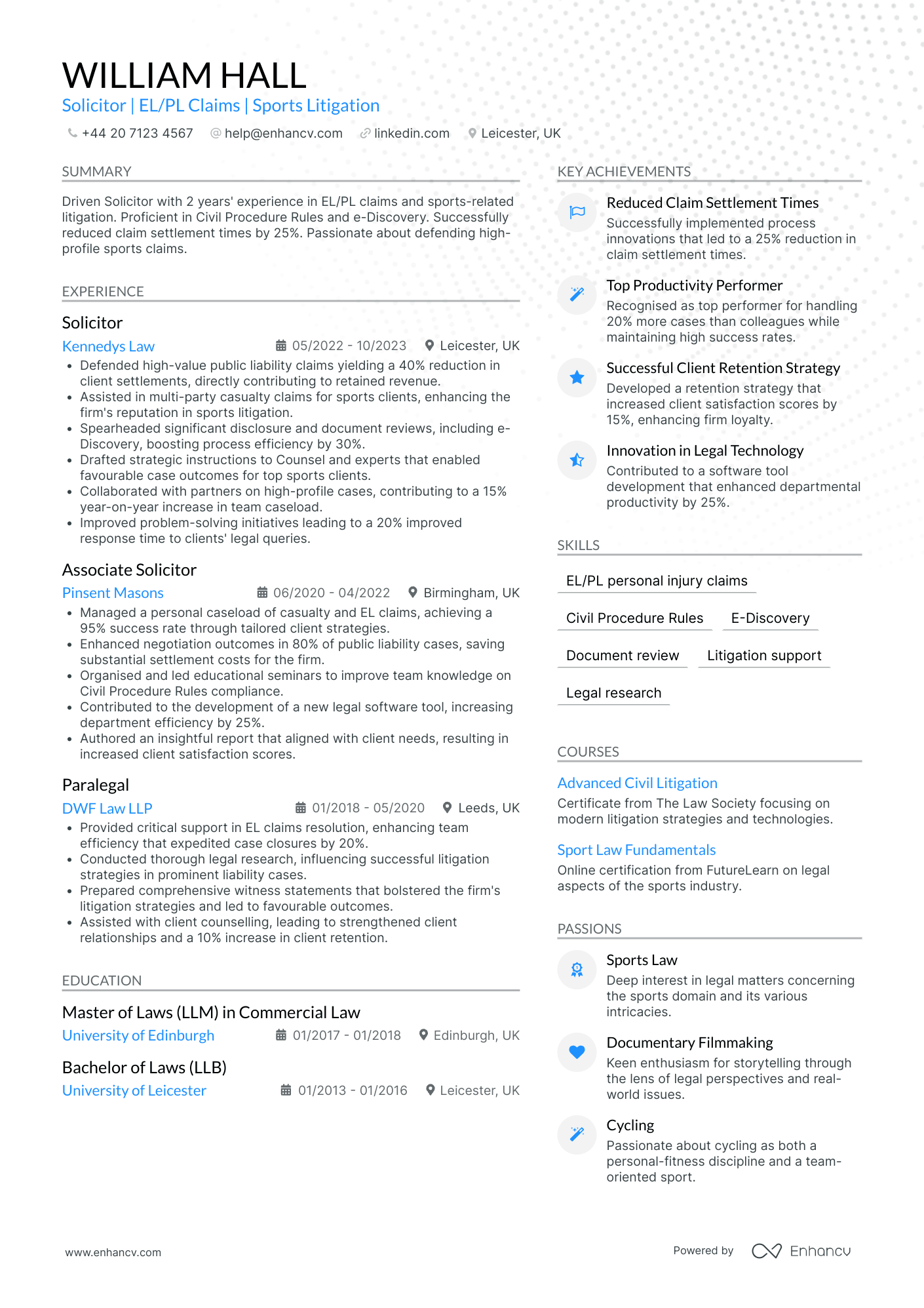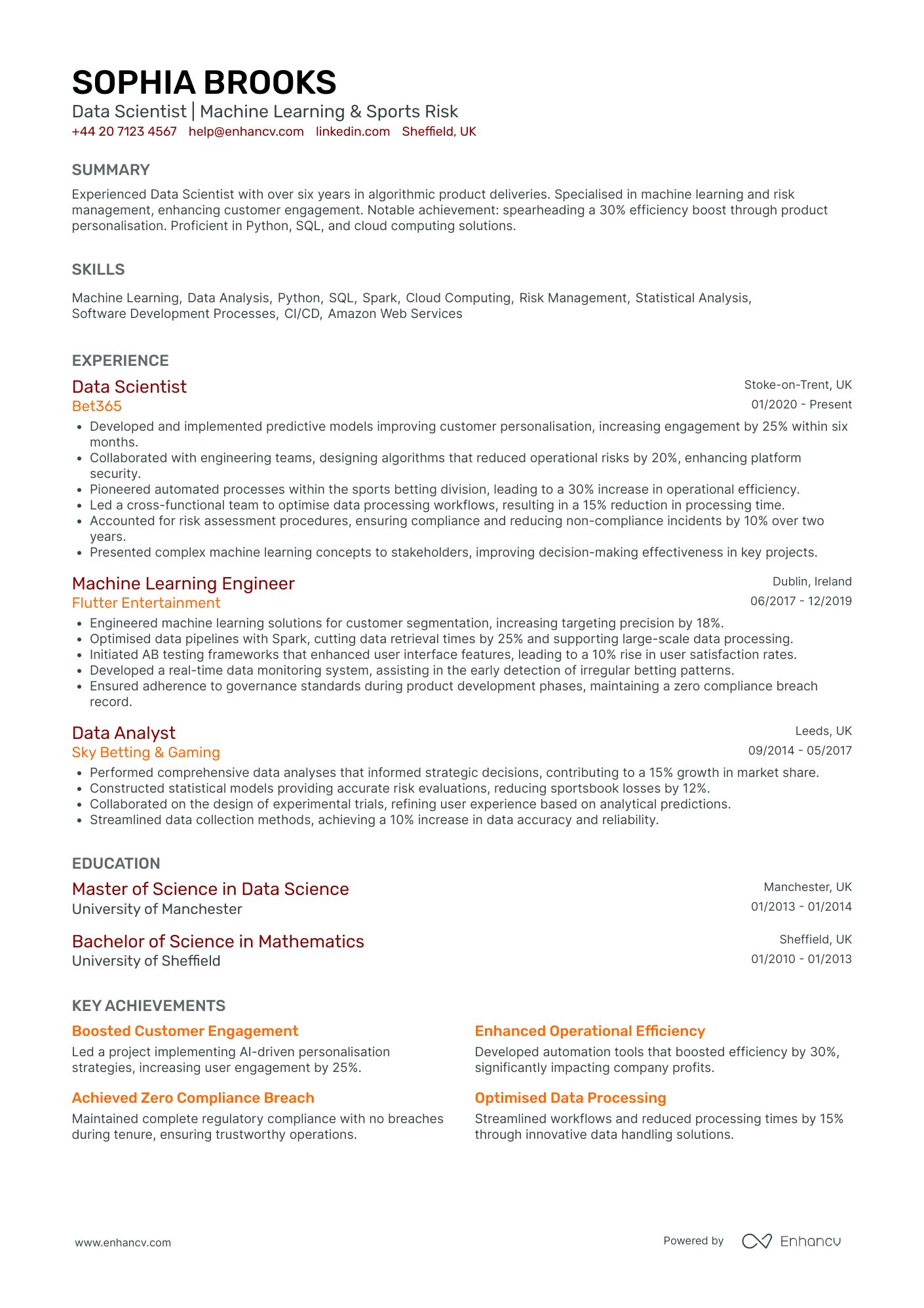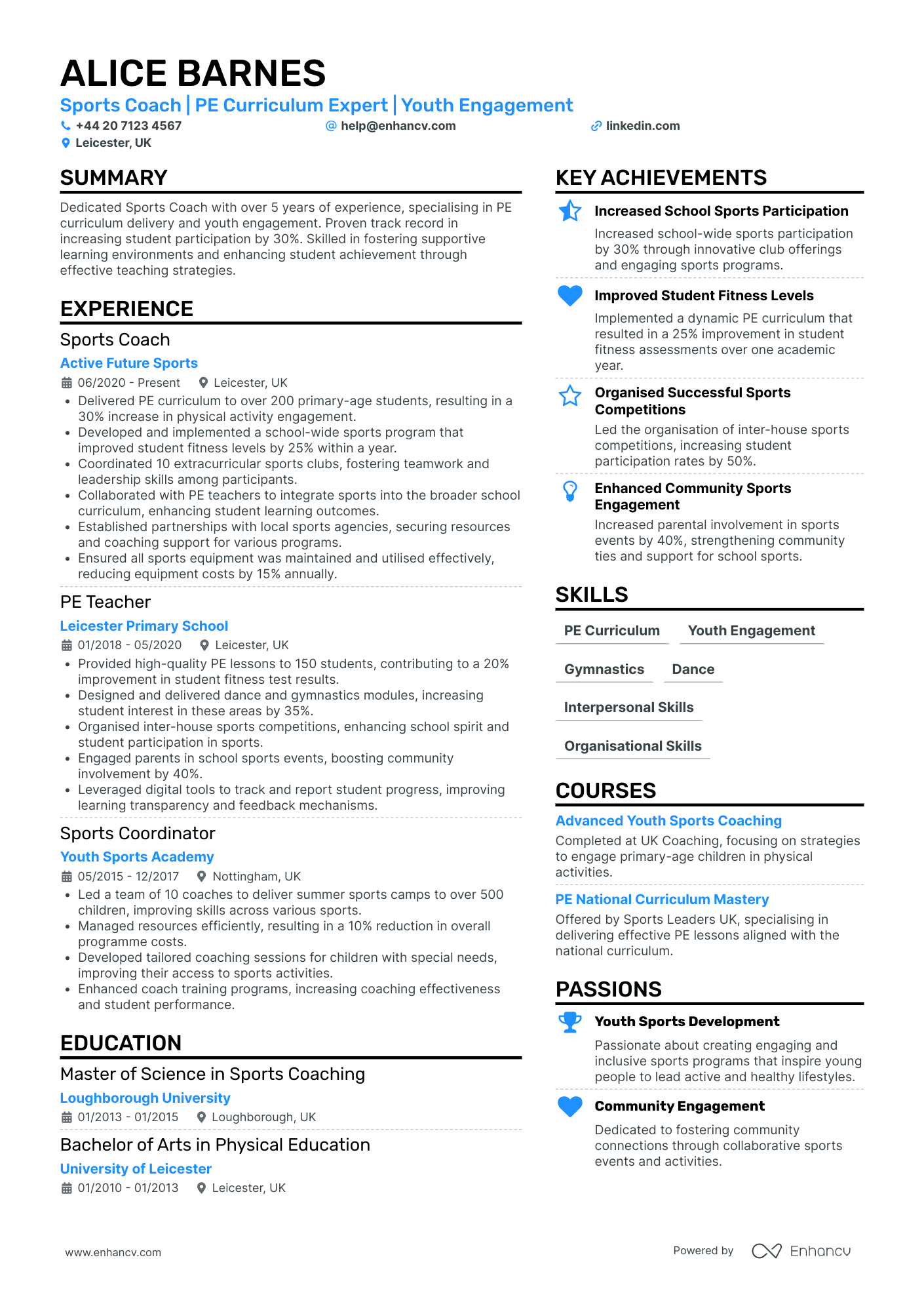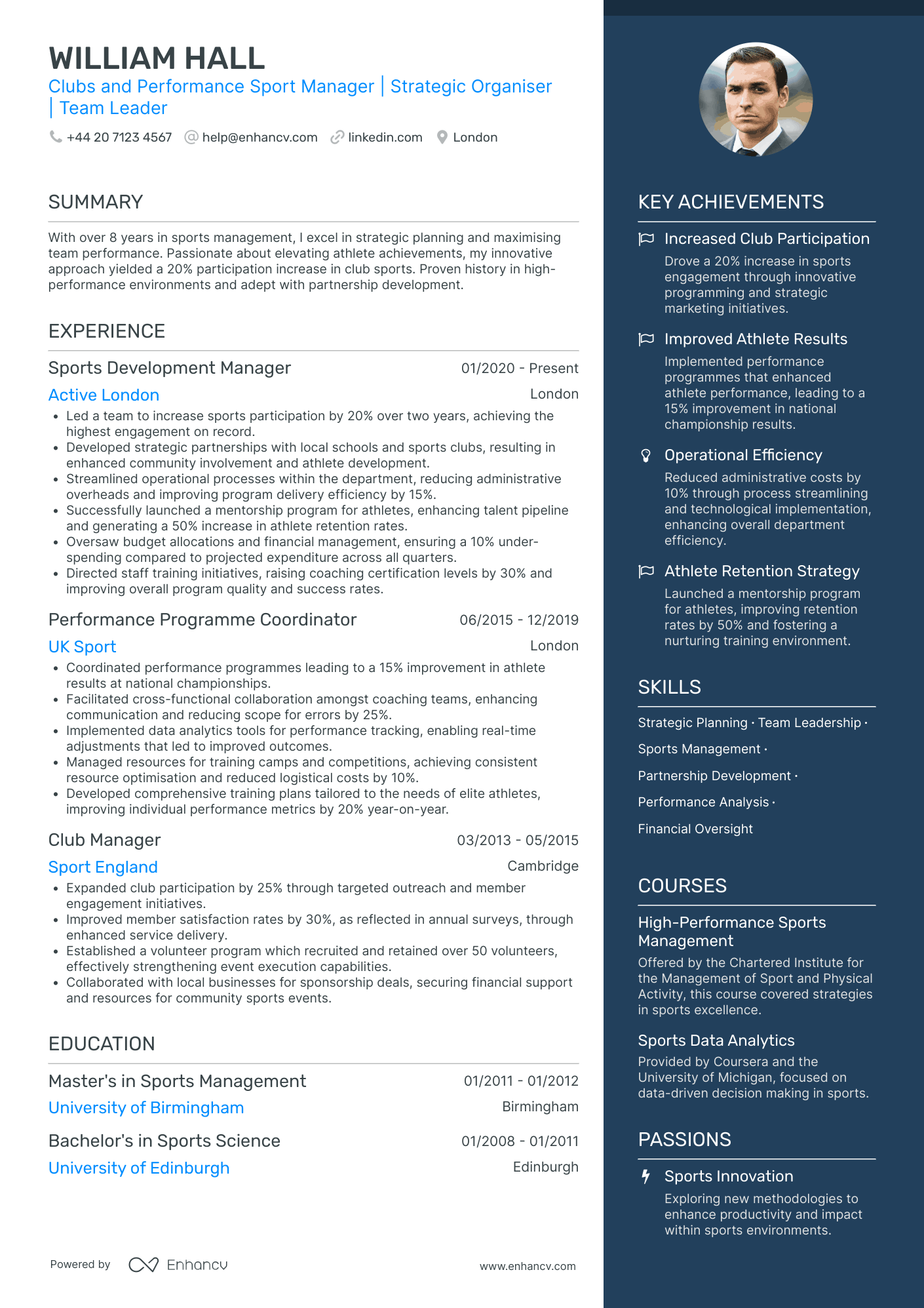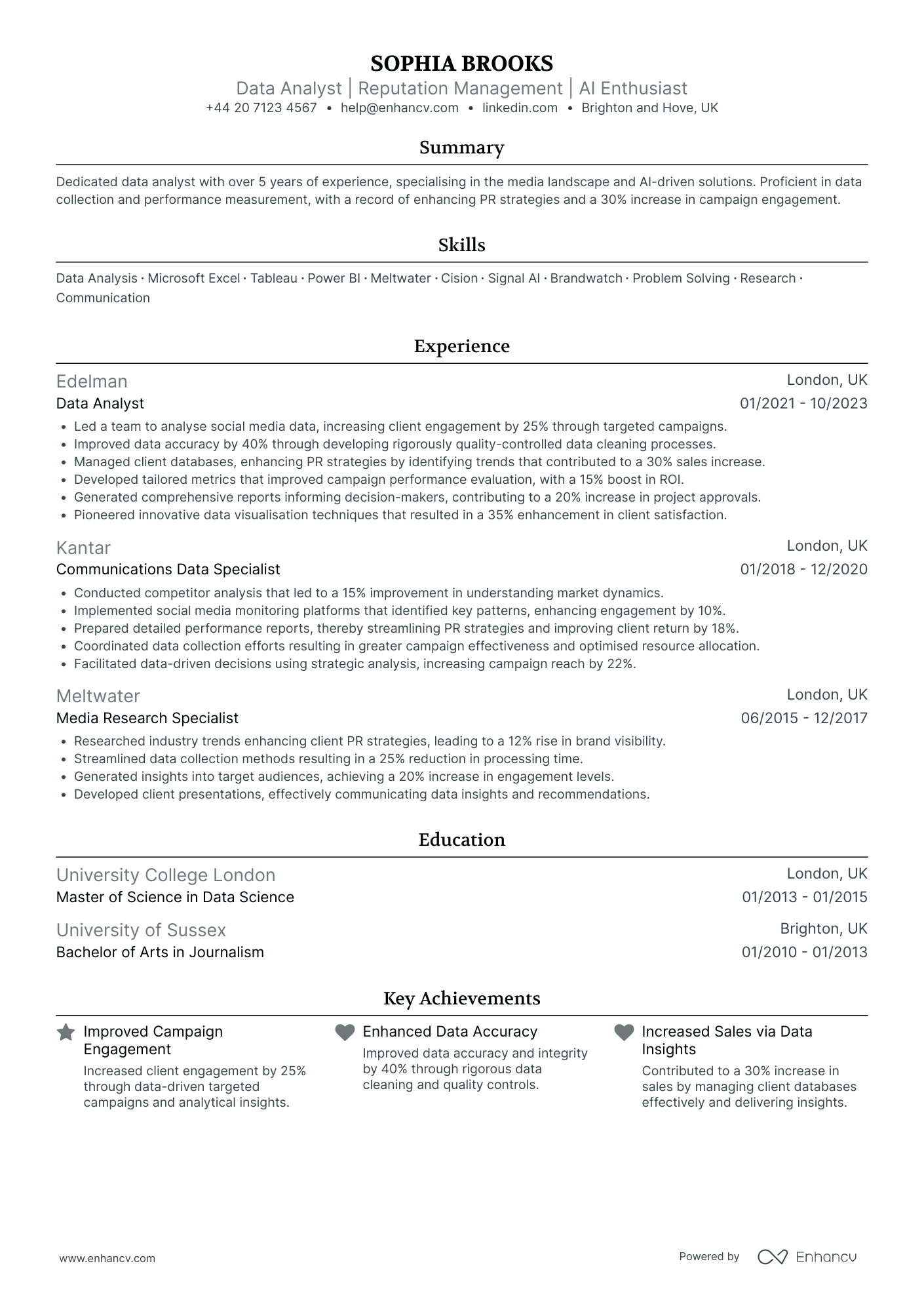One significant CV challenge in sports is the accurate tracking and analysis of player movements during a fast-paced game. Our guide offers detailed strategies and tailored computer vision techniques to enhance your system's real-time performance and accuracy, ensuring you don't miss a single play.
- Applying the simplest CV design, so that recruiters can easily understand your expertise, skills, and professional background;
- Ensuring you stand out with your header, summary or objective statement, and a designated skills section;
- Creating your CV experience section - no matter how much expertise you have;
- Using real life professional CV examples to enhance the structure and outline of your profile.
If you still have no muse to write your professional CV, find some more industry-leading examples.
Resume examples for sports
By Experience
Entry-Level Sports Agent
- Strong Emphasis on Results-Oriented Impact - The CV effectively highlights Daniel Baker's success in generating tangible business results, such as increasing sales by 30% and boosting a client satisfaction rate to 95%, indicating a profound impact on the organizations he has worked for.
- Career Growth and Strategic Roles - The progression from a Property Analyst to a Commercial Real Estate Consultant reflects a clear trajectory of growth, showcasing a steadily increasing set of responsibilities and the ability to take on more strategic roles within major real estate firms.
- Integration of Technology and Innovation - Daniel’s experience in implementing data management systems and enhancing digital marketing efforts demonstrates his focus on integrating technology to drive business efficiency, highlighting a forward-thinking approach to real estate strategy.
Mid-Level Sports Publicist
- Clear and concise presentation - The CV is organized with clearly defined sections, making it easy for recruiters to quickly identify key information. Each section is succinctly written, spanning relevant job roles and responsibilities without any unnecessary details, which helps in maintaining the reader's focus.
- Impressive career trajectory - Amelia's career progression from a Publicity Coordinator at Sony to a Senior Publicist at Warner Bros. demonstrates a forward-moving trajectory within the entertainment industry. Her promotions and consistent growth highlight her dedication and effectiveness in the field of publicity.
- Substantial impact through achievements - The CV emphatically showcases Amelia’s business impact with specific achievements, such as a 40% increase in sales from a record-breaking box office campaign. Such quantifiable results underscore her capability to contribute to strategic goals and drive business success.
Senior Sports Executive
- Well-structured content presentation - The CV is neatly organized, providing a clear overview of the candidate's skills and experiences. It begins with a succinct summary that outlines Arthur's core competencies and leadership prowess, followed by sections that are logically arranged to showcase his professional journey, achievements, education, skills, and additional qualifications.
- Progressive career trajectory - Arthur's career path displays a steady upward progression, indicative of his capability and ambition. Starting from a Member Service Manager role at Virgin Active, he advanced to Operations Manager at The Gym Group before ascending to the Director of Operations at David Lloyd Clubs. This progression highlights his increasing responsibilities and impact within the hospitality management industry.
- Impactful achievements with real-world implications - The CV goes beyond mere numbers by linking achievements to tangible business outcomes. For example, Arthur's efforts led to a 20% increase in member satisfaction and a consistent 15% revenue target surpassing, demonstrating not only quantitative success but also enhancing business credibility and operational effectiveness.
Junior Sports Therapist
- Well-Structured and Detailed Presentation - The CV is meticulously organized, starting with a concise header that sets the tone. Each section is clearly divided, highlighting key areas like experience, education, and skills, making it easy for readers to follow and absorb the relevant information quickly.
- Consistent Career Growth - The professional history showcases a logical progression from an intern role at Spire Healthcare to a full physical therapist at Nuffield Health. This trajectory reflects a clear pathway of growth and an accumulation of enhanced responsibilities, showcasing how Grace has developed her skills and enhanced her impact over time.
- Emphasis on Innovation and Patient Care - Unique to the industry, the CV highlights innovative initiatives like integrating yoga into rehabilitation programs, which demonstrates Grace's proactive approach to improving patient outcomes and her dedication to advancing rehabilitation methodologies.
Experienced Sports Statistician
- Concise and Structured Presentation - The CV impressively utilizes a clear, structured format that succinctly conveys essential information without overwhelming the reader. Key sections are well-organized, allowing for easy navigation through education, experience, skills, and achievements, contributing to a persuasive and digestible presentation.
- Strategic Career Progression - The document outlines a robust career trajectory, demonstrating significant growth from a Biostatistician at Wellcome Trust to a senior role at Oxford University, highlighting promotions and increasing responsibilities. The career moves reflect a focused commitment to the field of clinical trial statistics and evidence synthesis, signaling a deepening expertise.
- Impactful Achievements with Global Implications - The candidate’s accomplishments, such as securing a £1.5 million grant and leading a 30% efficiency boost in trial analyses, underscore not only technical competencies but also the tangible impact in global health contexts. These achievements emphasize the candidate's ability to contribute significantly to both academic and real-world healthcare improvements.
By Role
Sports Marketing Manager
- Extensive Career Growth in Sports Marketing - Finley Robinson’s CV highlights a remarkable career progression within the sports marketing industry, advancing from a Marketing Coordinator at Puma to a Sr. Lead Sports Marketing role at Nike. This trajectory underscores consistent professional development and the culmination of vast expertise accumulated over more than a decade.
- Integration of Cross-functional Collaboration and Innovation - The CV illustrates Finley’s innovative mindset and ability to collaborate effectively across various functions. By working with production innovation teams at Nike to adapt products based on athlete feedback, Finley has actively contributed to improved market responsiveness, showcasing both adaptability and a proactive approach to innovation.
- Significant Achievements with a Focus on Impact - Throughout the document, the CV emphasizes how Finley’s achievements translated into business success. For instance, the implementation of cross-functional campaigns at Nike led to a 20% increase in product visibility, demonstrating a direct impact on the brand's market presence and validating the practical relevance of Finley’s strategic initiatives.
Sports Physiotherapist
- Strategically advanced career path - The CV clearly illustrates Charlie Thomas's progression in the domain of sports physiotherapy, showcasing a strategic career path with increasing responsibility. Starting as a Physiotherapist at Nuffield Health, progressing to Chelsea Football Club, and eventually becoming a Senior Sports Physiotherapist at Harley Street Sports Medicine, it highlights their professional growth and deepening expertise in sports rehabilitation.
- Industry-specific certifications and ongoing education - The inclusion of a Master’s in Sports Physiotherapy and focused professional courses like Advanced Manual Therapy Techniques reflect a commitment to continuous learning and staying current with industry-specific methodologies, which are crucial in the ever-evolving field of sports physiotherapy.
- Demonstrated leadership and collaborative success - Experiences such as leading workshops on injury prevention, mentoring junior physiotherapists, and collaborating with multidisciplinary teams underscore Charlie's leadership ability and proficiency in fostering team success, contributing to improved treatment effectiveness and patient outcomes.
Sports Analyst
- Structured Career Growth - Thomas Walker's CV showcases a clear and progressive career trajectory in the field of sports performance analysis. Beginning as a Cricket Operations Coordinator at Surrey County Cricket Club, he ascended to more analytical roles such as Sports Data Analyst and eventually, Performance Analyst with the ECB. This path highlights his growth from operational to strategic responsibilities, demonstrating a deepening expertise in performance analysis.
- Robust Industry-Specific Tools and Methodologies - The CV effectively highlights Thomas’s proficiency with advanced cricket-specific analytical tools such as NV Play and PCS-Pro, as well as general data analysis platforms like Tableau. His ability to implement and streamline processes using these tools has directly led to significant improvements in team performance and operational efficiency, setting him apart in the sports analysis industry.
- Impactful Achievements Beyond Numbers - Beyond presenting impressive statistics, Thomas’s CV emphasizes the broader business impacts of his contributions. For instance, the integration of video analysis and tailored athlete solutions not only improved win rates and player metrics but also enhanced team preparation and strategic decision-making processes, underscoring his role as a catalyst for performance improvement and successful adaptation within the competitive sports landscape.
Sports Event Coordinator
- Clear and Structured Content Presentation - Scarlett Murphy’s CV is well-organized and concise, allowing for easy navigation through her professional journey. The use of bullet points under each job position helps highlight key achievements and responsibilities efficiently, reflecting clarity in presentation. This structured approach ensures that the most important information is readily accessible, making it more attractive to recruiters seeking quick insights.
- Progressive Career Trajectory - The CV clearly illustrates Scarlett’s career growth from a Sport Event Assistant to an Event Coordinator, showcasing her development within the sports event industry. Her steady progression is marked by increasing responsibilities, such as managing larger event budgets and leading volunteer teams, which underline her capability to take on more complex roles and challenges competently.
- Emphasis on Measurable Achievements and Impact - The achievements listed in Scarlett’s experience sections are supported by tangible numbers and percentages. For example, her ability to enhance logistical efficiency, increase volunteer retention, and optimize budgets by specific margins demonstrates her impactful contributions to the organizations she has worked with. This quantitative approach provides a clear picture of her worth and potential value to future employers.
Sports Nutritionist
- Effective Content Presentation - Freya Richardson's CV stands out through its clear and structured presentation, making it easy to follow her career journey. It presents information concisely, using bullet points to highlight key achievements and responsibilities, which enables quick scanning and ensures that important details are not missed.
- Strategic Career Trajectory - The CV effectively outlines Freya's progressive career growth, showcasing her headway from a Performance Dietitian to a Head Nutrition Consultant. This trajectory highlights her ability to take on increased responsibility in higher-profile roles, affirming her expertise and leadership in the sports nutrition field.
- Impactful Achievements with Business Relevance - Freya's accomplishments in her roles are not just about statistical improvements but are linked to significant impacts on player performance and well-being. For instance, a 20% performance improvement at Chelsea Football Club and zero doping violations at British Athletics underline her success in applying her expertise to enhance athletic outcomes. Such achievements are pivotal in demonstrating the tangible benefits of her strategic interventions in sports nutrition.
Sports Psychologist
- Strong career growth and specialization - The CV demonstrates an impressive career trajectory, showing a consistent rise from a Clinical Neuropsychologist to a Senior Neuropsychologist within a span of a few years—a clear indication of the candidate’s dedication and expertise development. This progression was achieved while staying within the healthcare sector, emphasizing a focused career path and deepening specialization in neuropsychology.
- In-depth technical expertise - It stands out by listing advanced neuro-cognitive testing techniques and pioneering new testing software integration, reflecting the candidate's commitment to leveraging the latest methodologies and technologies. This expertise underlines their technical depth within the neuropsychological domain, directly enhancing diagnostic accuracy and patient outcomes.
- Effective leadership and teamwork skills - The CV effectively highlights soft skills like team leadership and multidisciplinary collaboration, crucial for roles within a clinical setting. The candidate's experience in supervising a team, orchestrating workshops, and contributing to research projects showcases their ability to lead and work well within diverse professional teams, increasing overall efficiency and team competency.
Sports Equipment Manager
- Strong Career Progression - Ruby Gibson's CV clearly illustrates a well-defined career trajectory in the outdoor recreation industry, showing a steady growth from an Outdoor Activities Supervisor to her current role as an Outdoor Pursuits Manager. This progression not only highlights her commitment to the field but also her capability to take on increasingly complex responsibilities.
- Effective Leadership and Team Development - The CV emphasizes Ruby's leadership abilities, stating her success in managing diverse teams and improving staff retention rates and service efficiency. Her experience in developing innovative programs and leading teams has directly contributed to operational success and guest satisfaction. These points underline her natural aptitude for fostering team collaboration and leading by example.
- Impressive Achievements with Clear Business Impact - Ruby's accomplishments are well-documented with tangible business outcomes, such as her initiative to launch a summer camp series that boosted revenues by 15% and her role in increasing Kids Club participation by 30%. These metrics not only demonstrate her ability to innovate but also her knack for driving strategic initiatives that significantly enhance business performance.
Sports Broadcaster
- Showcases Career Progression and Leadership - The CV effectively demonstrates Harry Williams' career growth from a Sports Content Editor to a Lead Sports Broadcaster. Harry's progression illustrates an upward trajectory marked by increased responsibility and capability in leadership, as seen in roles like training junior broadcasters and managing live event execution.
- Emphasizes Cross-Functional Experience and Innovations - The document highlights Williams' capabilities in cross-functional collaboration, such as working with technical teams and producing award-winning documentaries. His contributions to innovative projects like virtual reality broadcasting further underline his adaptability and forward-thinking approach in the industry.
- Focuses on Impactful Achievements with Quantifiable Results - The achievements section provides objective measures of success, such as increasing viewer engagement by 30% and enhancing viewer experience with VR by 20%. These metrics not only showcase personal successes but also underscore their direct impact on business growth and audience development in the sports media sector.
Sports Lawyer
- Content Presentation Excellence - The CV presents information with clarity and structure, offering concise details in each section. It ensures that the reader can easily grasp William Hall's qualifications, career progression, and expertise in legal matters with a well-organized format, making key achievements and roles stand out distinctly.
- Rapid Career Progression and Industry Focus - William's career trajectory shows a swift rise through the legal ranks, demonstrating significant growth from a Paralegal to Solicitor within a few years. This progress reflects not only his capability and commitment but also his strategic positioning in the niche field of EL/PL claims and sports litigation.
- Industry-Specific Methodologies and Tools - The CV highlights William's adeptness with specialized legal tools and methodologies, such as Civil Procedure Rules and e-Discovery. His ability to spearhead document review efficiencies and contribute to legal software developments underscores his technical depth and innovative approach in the legal sector.
Sports Data Scientist
- Career Trajectory and Growth - Sophia Brooks's CV effectively outlines a clear progression in her career, demonstrating her growth from a Data Analyst at Sky Betting & Gaming to a Data Scientist at Bet365. This trajectory reflects her ability to advance and adapt to more complex roles within the fast-paced sports and betting industry, showcasing her increasing contribution and expertise in machine learning and risk management.
- Achievements and Business Impact - The CV includes significant achievements that are clearly articulated with specific and impressive metrics. For instance, achieving a 30% increase in operational efficiency through automation and a 25% boost in customer engagement through AI-driven personalization. These accomplishments highlight her ability to deliver substantial business value through her technical expertise.
- Industry-Specific Tools and Methodologies - Sophia's CV showcases her proficiency in critical industry tools and methodologies such as Python, SQL, Spark, cloud computing, and AWS, which are essential in the data science field. Her involvement in machine learning solutions and risk management further emphasizes her deep technical skills and understanding of complex data systems unique to the sports betting industry.
Sports Coach
- Clarity and Structure of the CV - Alice Barnes's CV is exceptionally well-organized and concise, with clearly defined sections that make it easy for the reader to identify key information. The use of bullet points under each role helps in quickly highlighting her accomplishments and responsibilities, ensuring that her expertise and experience are understood at a glance.
- Progression in Career Roles - The career trajectory of Alice shows a well-mapped path from a Sports Coordinator to a Sports Coach, reflecting a constant upward progression in responsibilities and achievements. Her movement from the Youth Sports Academy in Nottingham to leading the sports programs at Active Future Sports in Leicester demonstrates a deepening of expertise and a focus on enhancing sports education at multiple levels.
- Impactful Achievements with Industry Relevance - The CV effectively communicates Alice's significant achievements, such as increasing student participation in sports by 30% and improving student fitness levels by 25%. Rather than just listing numbers, these accomplishments reflect her ability to make a measurable impact in educational settings, which is crucial for potential employers aiming to enhance their physical education programs.
Sports Club Manager
- Strategic Leadership and Development Focus - William Hall's resume highlights a strong focus on strategic leadership within sports management, showcasing his capability to lead initiatives that yield tangible growth in participation and athlete development. His role in Active London, where he drove a 20% participation increase, underlines his strategic planning abilities and efficacy in impactful program delivery.
- Diverse Experience Across Renowned Organizations - Hall's career trajectory illustrates a steady progression across prestigious organizations like Active London, UK Sport, and Sport England. His role advancements from Club Manager to a more strategic Sports Development Manager position reflect his growth and adaptability within the industry, successfully managing larger teams and more complex responsibilities over time.
- Implementation of Innovative Performance Tracking Techniques - The use of data analytics tools, highlighted in his role as a Performance Programme Coordinator, showcases Hall's competence in adopting industry-specific technologies to enhance sports performance outcomes. His proficiency in real-time performance adjustments marks a unique technical depth and commitment to leveraging data for optimizing athlete success.
Sports Performance Analyst
- Career Growth and Industry Consistency - Sophia Brooks' CV reflects a clear and steady career trajectory in data analysis within media and PR sectors. The progression from a Media Research Specialist to a Data Analyst at a reputable firm like Edelman demonstrates a history of ascending roles, showing commitment and deepening expertise in her field. This upward mobility suggests a consistent enhancement of skills and responsibilities.
- Integration of AI and Tailored Metrics - A standout aspect of Sophia's background is her focus on AI-driven solutions and developing customized metrics. These tools are pioneering within the reputation management sphere, implying she brings innovative thinking and technical depth to the table. Her work with AI, especially in creating metrics that boosted campaign ROI by 15%, showcases her ability to merge complex analytical methodologies with practical application.
- Cross-Functional Skills and Leadership Roles - The CV details Sophia's adeptness in leading teams and managing databases, which highlights her ability to operate cross-functionally and influence decision-making processes. The emphasis on improving client engagement and satisfaction through leadership, exemplifies her soft skills and capacity to foster collaboration in diverse environments, pivotal in any analytical-driven role.
How complex should the format of your sports CV be?
Perhaps, you decided to use a fancy font and plenty of colours to ensure your sports CV stands out amongst the pile of other candidate profiles. Alas - this may confuse recruiters. By keeping your format simple and organising your information coherently, you'll ultimately make a better impression. What matters most is your experience, while your CV format should act as complementary thing by:
- Presenting the information in a reverse chronological order with the most recent of your jobs first. This is done so that your career history stays organised and is aligned to the role;
- Making it easy for recruiters to get in touch with you by including your contact details in the CV header. Regarding the design of your CV header, include plenty of white space and icons to draw attention to your information. If you're applying for roles in the UK, don't include a photo, as this is considered a bad practice;
- Organising your most important CV sections with consistent colours, plenty of white space, and appropriate margins (2.54 cm). Remember that your CV design should always aim at legibility and to spotlight your key information;
- Writing no more than two pages of your relevant experience. For candidates who are just starting out in the field, we recommend to have an one-page CV.
One more thing about your CV format - you may be worried if your double column CV is Applicant Tracker System (ATS) complaint. In our recent study, we discovered that both single and double-column CVs are ATS-friendly . Most ATSes out there can also read all serif and sans serif fonts. We suggest you go with modern, yet simple, fonts (e.g. Rubik, Lato, Raleway) instead of the classic Times New Roman. You'll want your application to stand out, and many candidates still go for the classics. Finally, you'll have to export your CV. If you're wondering if you should select Doc or PDF, we always advise going with PDF. Your CV in PDF will stay intact and opens easily on every OS, including Mac OS.
PRO TIP
Be mindful of white space; too much can make the CV look sparse, too little can make it look cluttered. Strive for a balance that makes the document easy on the eyes.
The top sections on a sports CV
- Personal Details: Reveals contact information and age.
- Playing History: Chronicles teams and levels played.
- Position Specific Skills: Highlights expertise in the role.
- Sports Achievements: Showcases awards and recognitions.
- Fitness and Physical Data: Indicates stamina and health metrics.
What recruiters value on your CV:
- Highlight specific athletic achievements, including any records held, championships won or significant milestones achieved in the sport you are involved in, demonstrating performance and competitiveness.
- Include detailed information about your sports-related education and qualifications, such as coaching certifications, sports management courses, or degrees in sports science, to establish credibility and expertise.
- Detail your experience in teamwork and leadership roles within your sport, which may include captaincy, mentoring, or coordinating team activities, showcasing soft skills that are vital for teamwork in sports environments.
- Outline your familiarity with sports technology and analytics, if relevant, displaying your ability to engage with modern sports performance tools and data analysis that can give teams a competitive edge.
- Emphasise transferable skills such as discipline, determination, and resilience, acquired through sports, that are applicable to various responsibilities in the sports industry, including management and coaching positions.
Recommended reads:
How to present your contact details and job keywords in your sports CV header
Located at the top of your sports CV, the header presents recruiters with your key personal information, headline, and professional photo. When creating your CV header, include your:
- Contact details - avoid listing your work email or telephone number and, also, email addresses that sound unprofessional (e.g. koolKittyCat$3@gmail.com is definitely a big no);
- Headline - it should be relevant, concise, and specific to the role you're applying for, integrating keywords and action verbs;
- Photo - instead of including a photograph from your family reunion, select one that shows you in a more professional light. It's also good to note that in some countries (e.g. the UK and US), it's best to avoid photos on your CV as they may serve as bias.
What do other industry professionals include in their CV header? Make sure to check out the next bit of your guide to see real-life examples:
Examples of good CV headlines for sports:
- Professional Footballer | UEFA Pro Licence | Leadership & Teamwork Specialist | 15+ Years' Experience
- Elite Performance Coach | Athletics Expert | MSc Sports Science | Talent Development | 10 Years' Coaching
- Senior Sports Physiotherapist | Specialist in Musculoskeletal Rehabilitation | BSc (Hons), MCSP | 12 Years' Clinical Expertise
- International Cricket Player | Batting Technique Consultant | ACC Level 3 Coach | 20-Year Professional Career
- Sports Marketing Manager | Brand Strategy & Sponsorship Guru | MBA Sports Management | 8 Years' Industry Impact
- Head Strength & Conditioning Coach | Olympic Athlete Preparation | NSCA-CSCS Certified | 15+ Years' High-Performance Training
Choosing your opening statement: a sports CV summary or objective
At the top one third of your CV, you have the chance to make a more personable impression on recruiters by selecting between:
- Summary - or those three to five sentences that you use to show your greatest achievements. Use the CV summary if you happen to have plenty of relevant experience and wish to highlight your greatest successes;
- Objective - provides you with up to five sentences to state your professional aims and mission in the company you're applying for
CV summaries for a sports job:
- Dedicated professional with over 8 years of experience in competitive basketball coaching, specialising in youth athletic development. Possesses in-depth knowledge of gameplay strategies, skill-building exercises, and team management. Proud of leading the under-16 team to regional victory in the National Youth Basketball League.
- Highly skilled football scout with 10 years of experience identifying and nurturing talent across Europe. Expert in player analysis, performance metrics, and recruitment strategies, with a track record of discovering key players for top-tier clubs. Instrumental in securing talent that propelled a local team to its first national championship.
- Seasoned marketing manager pivoting into sports event management, bringing over 12 years' experience in large-scale project coordination, robust client relations, and strategic planning. Proven success in orchestrating high-profile corporate events, eager to channel expertise into promoting world-class sports tournaments and elevating audience engagement.
- Renowned chef with a passion for nutrition and fitness, transitioning to a sports nutritionist role after 15 years in the culinary industry. Brings a wealth of knowledge on dietary requirements, meal planning, and food science, eager to contribute to peak athletic performance with customised nutrition plans for elite athletes.
- Aspiring sports psychologist committed to pursuing a career dedicated to enhancing athletes' mental resilience and performance. Eager to apply recent Master's degree knowledge in Psychology and intern experience with local sports teams to help athletes achieve their full potential through psychological assessment and skillful mental coaching.
- Enthusiastic graduate in Sports Management, aiming to utilise academic training and a keen interest in sports analytics to impact the sports industry positively. Armed with strong analytical skills and a fresh perspective, ready to contribute to the strategic growth and success of emerging sports franchises or athletic programs.
Best practices for writing your sports CV experience section
If your profile matches the job requirements, the CV experience is the section which recruiters will spend the most time studying. Within your experience bullets, include not merely your career history, but, rather, your skills and outcomes from each individual role. Your best experience section should promote your profile by:
- including specific details and hard numbers as proof of your past success;
- listing your experience in the functional-based or hybrid format (by focusing on the skills), if you happen to have less professional, relevant expertise;
- showcasing your growth by organising your roles, starting with the latest and (hopefully) most senior one;
- staring off each experience bullet with a verb, following up with skills that match the job description, and the outcomes of your responsibility.
Add keywords from the job advert in your experience section, like the professional CV examples:
Best practices for your CV's work experience section
- Quantify achievements: State how many competitions you've participated in or won. Provide specific statistics or records you've set to demonstrate your proficiency in your sport.
- Teamwork skills: Highlight your experience in working with a team, sharing tactics and strategies. Mention any leadership roles you've held, such as team captain, and the responsibilities that came with them.
- Training and discipline: Detail your daily or weekly training regimen, and how you've maintained peak physical condition. Discuss any special dietary or fitness routines you follow that contribute to your athletic performance.
- Technical proficiency: Describe specific technical skills relevant to your sport, such as a footballer detailing dribbling techniques or a cricketer discussing bowling styles. Make sure to include how you've improved these skills over time, demonstrating a commitment to personal development.
- Coaching and mentoring: If you have experience in coaching, provide examples of how you've helped improve others' performances. Share any mentoring or development programmes you’ve been involved with, showing your dedication to the sport beyond personal achievement.
- Injury management: Discuss any injuries you've overcome, what they taught you about body management, and how this knowledge has helped maintain your athletic longevity. Include any rehabilitation programmes you've completed and how they've informed your approach to training.
- Adaptability: Give examples of how you've adapted to different coaches, strategies, or team environments. Demonstrate your ability to be flexible and successful in varied sporting contexts.
- Competitive edge: Explain what sets you apart from others in your sport, such as a unique playing style or unmatched endurance. Share how you've cultivated these unique traits to succeed in competitive environments.
- Professional development: Include any courses, workshops or certifications relevant to your sport, such as sports medicine or psychology. Illustrate your continuous commitment to learning and improving within your sport's discipline.
- Developed and executed strategic marketing campaigns for major sporting events, increasing brand visibility by 30%.
- Led the team in securing sponsorship deals with key partners, resulting in a 20% increase in annual revenue.
- Introduced data-driven approaches to track athlete performance, improving training outcomes and competitive results.
- Coordinated logistics for international sports events, including transportation and accommodation for over 500 athletes.
- Managed a cross-functional team to deliver complex projects, enhancing the fan experience at live events.
- Implemented new athlete development programs that fostered talent and reduced injury rates by 15%.
- Revamped the college's athletic recruitment strategy, increasing enrollment of student-athletes by 40%.
- Oversaw the successful bidding process for collegiate championships, bringing significant attention to the institution.
- Secured funding for athletic facility upgrades, which enhanced training capabilities and attracted high-caliber coaching staff.
- Created comprehensive workout and nutrition plans for professional sports teams, optimizing player performance.
- Spearheaded community outreach initiatives, broadening the team's fan base and increasing game attendance by 25%.
- Monitored industry trends to advise on technology investments for player tracking and performance analysis.
- Developed a robust scouting network that identified and secured emerging talent for the team's roster.
- Negotiated endorsement deals for athletes, amplifying the team's market presence and generating additional income streams.
- Collaborated on the launch of a sports analytics division, driving a 10% improvement in team win rates.
- Managed sports merchandise portfolio, achieving a year-over-year sales increase of 22% through targeted marketing strategies.
- Established a youth academy program, which contributed to the development of two Olympians within the first three years.
- Collaborated with designers to develop high-performance sportswear, leading to a successful product line launch.
- Organized sports conventions, managing over 200 vendors and attracting over 10,000 attendees annually.
- Led a project to integrate virtual reality technology in training sessions, elevating the immersion and effectiveness of the training programs.
- Managed corporate wellness programs, significantly reducing employee healthcare costs by enhancing their physical fitness through sports activities.
- Designed and executed promotional events for major athletic brands, resulting in a 35% uptick in product trials.
- Forged partnerships with local sports clubs to expand grassroots marketing efforts and bolster community engagement.
- Piloted a social media campaign that doubled the online following for our sports event planning services.
- Administered sports therapy and rehabilitation programs, reducing athlete recovery time by an average of 20%.
- Devised and executed research projects on sports psychology, enhancing team cohesion and mental resilience.
- Integrated cutting-edge wearable technology to monitor athlete vitals, boosting overall team performance.
- Coordinated with broadcasting partners to ensure seamless delivery of live sports events to millions of viewers.
- Managed a portfolio of sports equipment, ensuring all teams were equipped with top-tier gear for optimal performance.
- Implemented a fan engagement platform that saw a 50% increase in interactions during the sports season.
What to add in your sports CV experience section with no professional experience
If you don't have the standard nine-to-five professional experience, yet are still keen on applying for the job, here's what you can do:
- List any internships, part-time roles, volunteer experience, or basically any work you've done that meets the job requirements and is in the same industry;
- Showcase any project you've done in your free time (even if you completed them with family and friends) that will hint at your experience and skill set;
- Replace the standard, CV experience section with a strengths or achievements one. This will help you spotlight your transferrable skills that apply to the role.
Recommended reads:
PRO TIP
If applicable, briefly mention a situation where things didn’t go as planned and what you learned from it, demonstrating your ability to learn and adapt.
Hard skills and soft skills to showcase your unique skill set on your sports CV
Did you know that your CV will mostly likely be assessed by recruiters based on skill alignment? And that means that the way you feature your key skills across different CV sections will play a crucial role in landing you that first interview. We recommend you add your:
- technical capabilities or hard skills in your CV experience, certificates, projects, etc. Use your past accomplishments to prove your technical capabilities. List up to a dozen different software or hardware in your dedicated skills section to match the job keywords;
- personal and communication skills or soft skills in your CV strengths, achievements, summary/ objective, etc. Soft skills are a bit more difficult to prove. How do you define your aptitude in active listening? So, instead of just listing the skill name, include a tangible metric to show your success.
On a final note, when you're in a hurry to create your profile, you may misspell a particular technology or soft skill. That's why we suggest you copy and paste the particular skill name (or keyword), directly from the job advert. This would also help you to pass any initial Applicant Tracker System (ATS) tests.
Top skills for your sports CV:
Athletic Training
Sports Management
Coaching Techniques
Fitness Assessment
Nutrition Planning
Game Strategy Development
Sports Psychology Knowledge
First Aid and CPR Certified
Event Organisation
Data Analysis and Performance Metrics
Teamwork
Leadership
Time Management
Communication
Adaptability
Problem-Solving
Critical Thinking
Work Ethic
Motivation
Interpersonal Skills
PRO TIP
If there's a noticeable gap in your skillset for the role you're applying for, mention any steps you're taking to acquire these skills, such as online courses or self-study.
Further professional qualifications for your sports CV: education and certificates
As you're nearing the end of your sports CV, you may wonder what else will be relevant to the role. Recruiters are keen on understanding your academic background, as it teaches you an array of hard and soft skills. Create a dedicated education section that lists your:
- applicable higher education diplomas or ones that are at a postgraduate level;
- diploma, followed up with your higher education institution and start-graduation dates;
- extracurricular activities and honours, only if you deem that recruiters will find them impressive.
Follow a similar logic when presenting your certificates. Always select ones that will support your niche expertise and hint at what it's like to work with you. Balance both technical certification with soft skills courses to answer job requirements and company values. Wondering what the most sought out certificates are for the industry? Look no further:
PRO TIP
If there's a noticeable gap in your skillset for the role you're applying for, mention any steps you're taking to acquire these skills, such as online courses or self-study.
Recommended reads:
Key takeaways
Here are five things you need to remember about writing your sports CV for success:
- Sort your experience based on the reverse chronological order, starting with your most recent career items, to showcase how you've grown your career;
- Include within your CV header your relevant contact details, a headline that could spotlight your unique value, and a photo - if you're applying for roles outside the UK or US;
- Decide to use the CV summary, if you happen to have more professional experience, and an objective, if you want to showcase your career goals;
- Within the experience section, write your bullets using action verbs, skills, and success, instead of just merely listing your on-the-job responsibilities;
- Prove your technical skills, using your education and certificates, and your soft skills, with your achievements and strengths sections.
